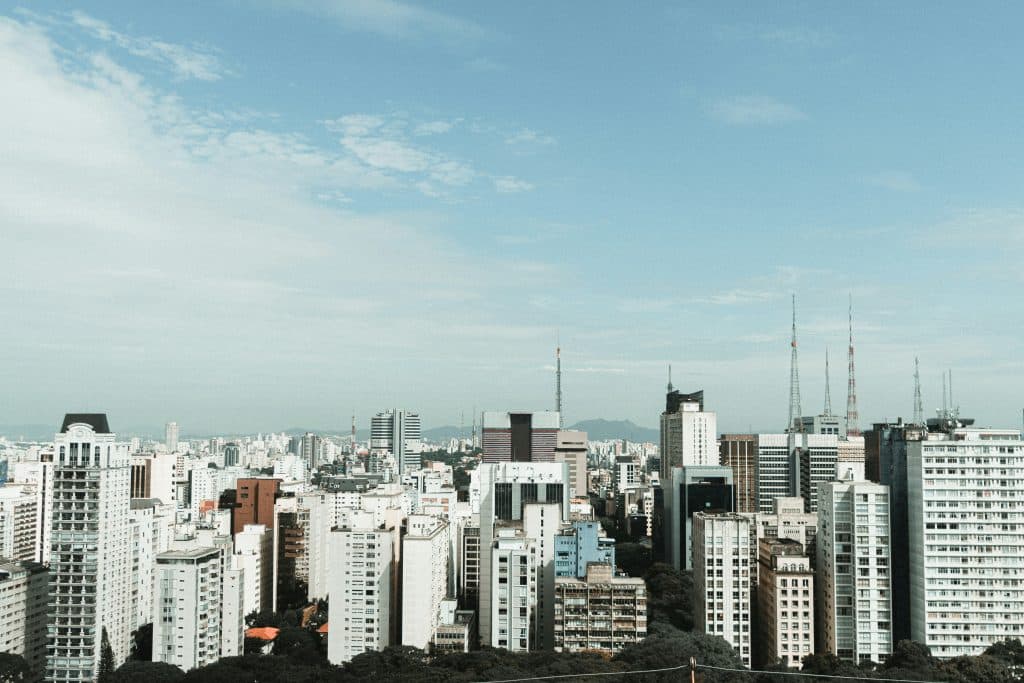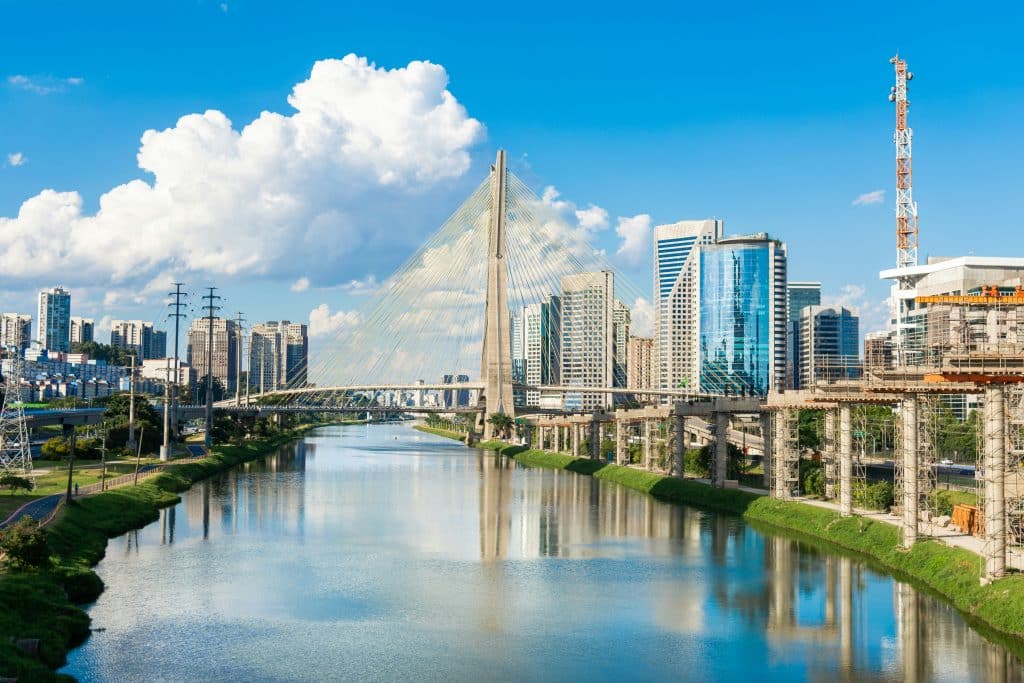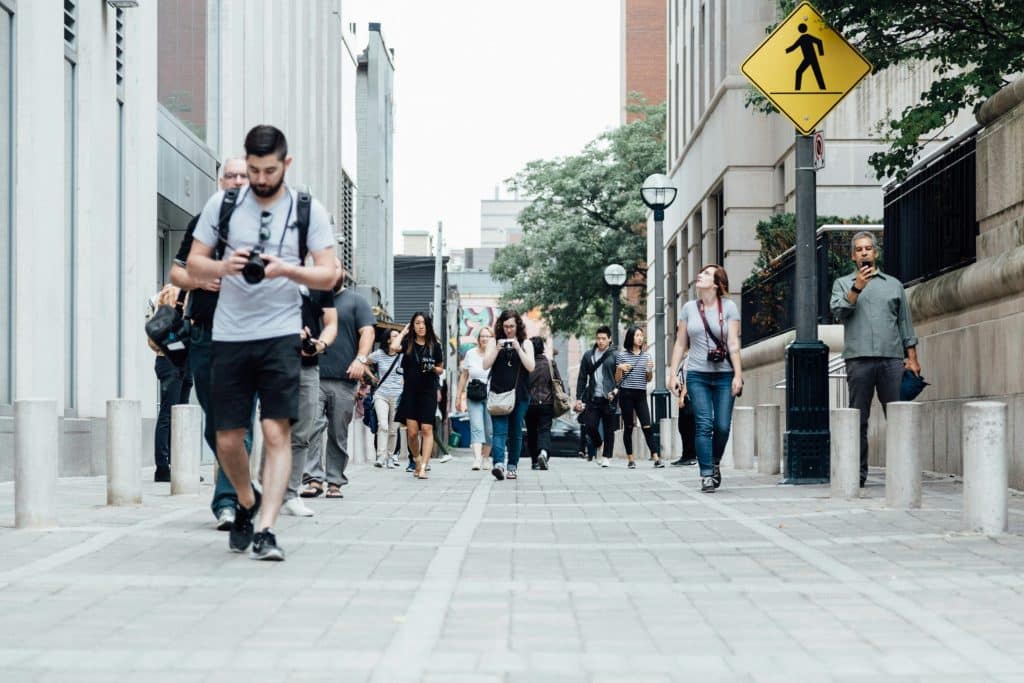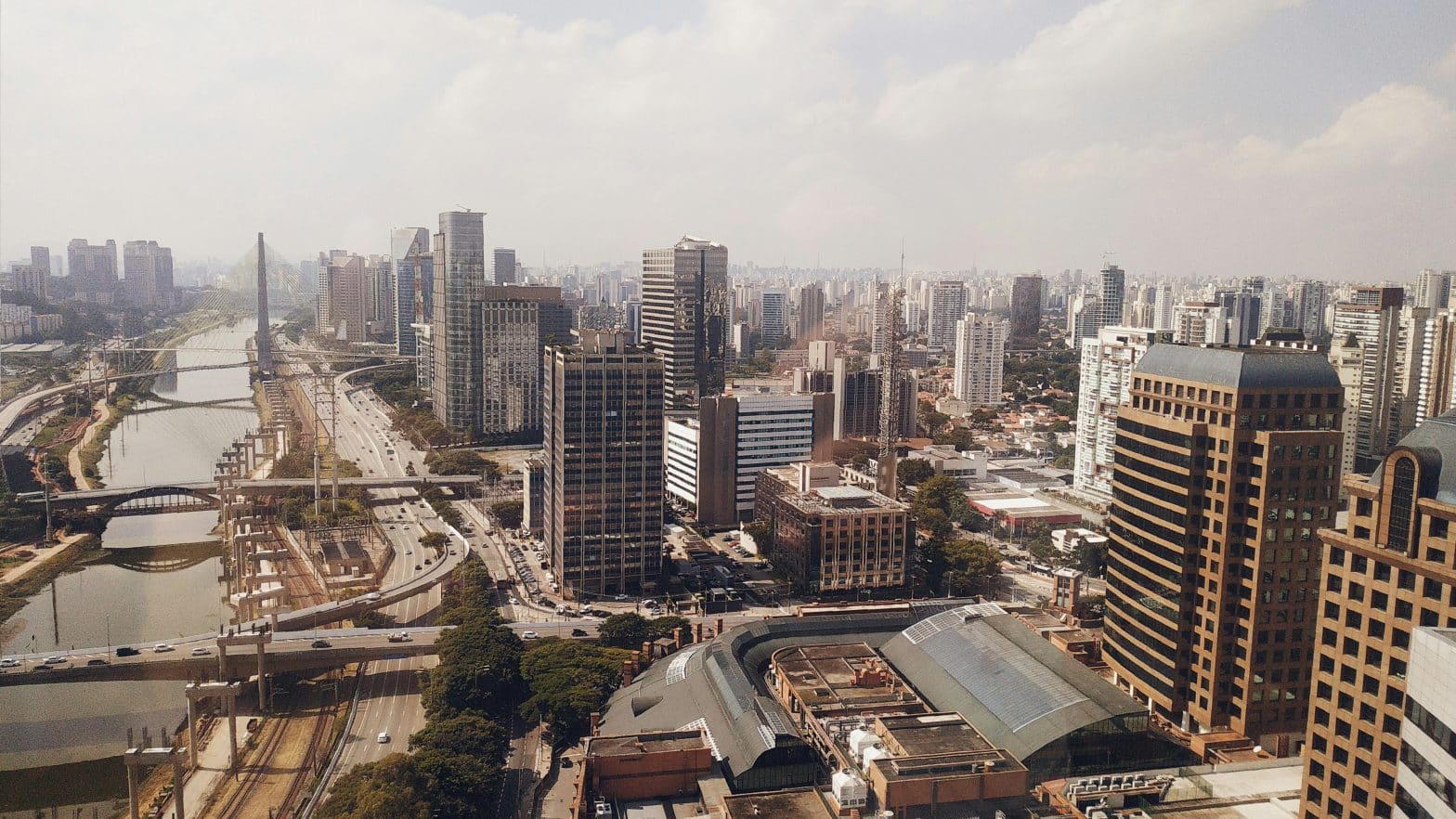On arriving in Sao Paulo for the first time, all foreigners feel the same emotion: amazement. Skyscrapers, green spaces, trendy restaurants and art galleries … Sao Paulo is every bit as good as the world’s greatest capitals.
The economic centre of Brazil and a major industrial hub in South America, the city is as fascinating as it is impressive. Everything here is on a huge scale: 12,000,000 inhabitants, luxurious neighbourhoods rubbing shoulders with working-class districts and urban planning giving way to surprising natural spaces.
Are you thinking of moving there? Visa, budget, safety, employment … here is a comprehensive guide to help you make a success of your relocation to Sao Paulo!
Living in Sao Paulo: the pros and cons
Pros
- Relatively low cost of living
- A tropical climate par excellence: mild winters and hot summers
- A city chosen by more than 60% of the country’s companies as the location for their headquarters
- A cosmopolitan city with one of the richest cultural diversities in the world (more than 60% of the inhabitants are of Italian origin, but there are also large Spanish, Portuguese, German and Japanese communities)
- More than 5,000 schools, making it the largest education network in Brazil
- A city where culture occupies a central place
Disadvantages
- Many (many) traffic jams
- You come up against the language barrier (Portuguese)
- The many hours of flying to reach the rest of the world ( over 11 hours to London, for example)

The steps to take to successfully move to Brazil
1. Obtain a long-stay visa
In general, citizens of European countries (France, Switzerland, Germany, Belgium, etc.) can stay in Brazil for up to 90 days without a visa. However, to settle there, it is necessary to apply for a long-stay visa. Several options are available, including:
- VITEM V: the Brazilian work visa for foreigners who have obtained a job in Brazil;
- VITEM I: intended for researchers, teachers and postgraduate students;
- VITEM IX: for investors who intend to invest in the Brazilian market (real estate, companies, etc.);
- VITEM XIV: visa for retirees.
You can apply for a visa by appointment at the Consulate General of Brazil in your country of residence or online on its official website.
2. Obtaining your residence card
After obtaining your visa and once you have arrived, to live in Brazil, you must apply for a residence card, known as the National Migration Registration Card (CRNM).
This application can only be made on site, within 30 days of your arrival, by going to the Federal Police in Sao Paulo.

3. Applying for a tax identification number (CPF)
To open a bank account, sign a lease, subscribe to a telephone line or even buy a property, you must obtain a Cadastro de Pessoas Físicas (CPF), i.e. a tax identification number.
You can apply for it remotely at the Brazilian embassy or directly on the official website of the federal tax administration: https://www.receita.fazenda.gov.br/
4. Obtaining the Work Card
In some cases, in addition to a VITEM V visa, you must apply for the work card (Carteira de Trabalho) to be entitled to work in Brazil.
Accommodation in Sao Paulo

Sao Paulo is divided into 31 neighbourhoods, which are themselves subdivided into more than 90 districts. The city offers a wide variety of residential neighbourhoods, each with its own atmosphere and lifestyle.
We advise you to choose your neighbourhood according to your place of work. São Paulo is a huge metropolis and daily commuting can quickly become a chore.
The neighbourhoods to favour as an expat
Some districts are popular with foreigners, in particular:
Pinheiros: a dynamic district with several appealing neighbourhoods, including the lively Jardins, the bohemian Vila Madalena, and Brooklin Novo, a thriving commercial area.
Vila Mariana: this district is home to the neighbourhood of the same name, as well as Vila Clementino, an upmarket area, and Saúde, popular for its nearby green spaces.
Consolação: the chic neighbourhood of Higienópolis stands out in particular, especially for its peaceful atmosphere.
Santo Amaro: an ideal choice for expats looking for elegant residential neighbourhoods, such as Campo Belo and Granja Julieta, perfect for family life.
Moema: the neighbourhoods of Moema are popular for their proximity to Ibirapuera Park, the green lung of the city.
What should I expect to pay in rent?
The amount of rent in Sao Paulo depends on the neighbourhood chosen, some being more expensive than others.
However, the following average prices can be observed:
| Type of accommodation | Budget to be expected |
|---|---|
| One-bedroom apartment | 600 euros per month in the city centre and 360 euros per month outside the city centre |
| Three-bedroom apartment | 1,145 euros per month in the city centre and 690 euros outside |
| Purchase price | 1,100 to 3,200 euros / m2 |
The cost of living in Sao Paulo
The cost of living in Sao Paulo is lower than in some European cities. For example, it is around 80% lower than in Lyon, France.
To live in Sao Paulo, a single person needs a monthly budget of around 1,250 euros, while a family of four needs around 3,200 euros, including rent.

Cost of living in Sao Paulo vs Rio de Janeiro
Sao Paulo remains the most expensive city in Brazil, ahead of Rio de Janeiro. The budget needed to live in Rio is 13% lower than in Sao Paulo.
However, the pace of life differs between the two cities. Rio de Janeiro, although economically active, lags behind Sao Paulo, which remains the continent’s main economic centre. On the other hand, tourism is more developed there, driven by its seaside lifestyle (Copacabana, Leblon, etc.) and its famous carnivals.
If you are interested in the subject, consult our complete guide to the cost of living in Brazil.
What salary do you need to live well in Sao Paulo?
The average salary of an employee in Sao Paulo is 123,000 Brazilian reais per year, or about 20,000 euros. This salary offers a comfortable standard of living for a single person.
If you work for an international company, you will often enjoy a higher salary and a better quality of life.
Life as an expat in Sao Paulo
Safety: is Sao Paulo dangerous?
In reality, security in Sao Paulo is generally better than in other regions of Brazil. The figures show a decline in crime over the last few years.
However, some governments recommend remaining vigilant, particularly in the historic city centre (Centro), where certain neighbourhoods, such as Praça da República, Praça da Sé and Estação da Luz, remain sensitive areas, particularly due to drug trafficking.
Getting around like a local
Living in Sao Paulo, with its 12 million inhabitants, means accepting the fact that you will have to put up with terrible traffic jams! This is why many expats end up using public transport, especially the metro and buses.
As for fares, a metro ticket costs 4.40 reais (around 0.85 euros) and a combined ticket (metro + bus) valid for 3 hours costs 7.65 reais (around 1.50 euros). We recommend getting a rechargeable Fidelity card to make travelling easier.
And for the more adventurous who want to drive in Sao Paulo, we recommend downloading the ‘Waze’ app to follow the traffic situation in real time.

Family life in Sao Paulo
Moving to Sao Paulo with the family is a choice made by many expats, for several reasons. The city offers a pleasant living environment, with vast green spaces and a multitude of activities suitable for families.
Sao Paulo is home to quality schools, including several international establishments:
- St. Paul’s British International School
- St Nicholas School Pinheiros
- Maple Bear Canadian School
At the weekend, there are many activities for families to enjoy:
- Enjoy the green spaces of Ibirapuera Park
- Stroll along the famous Avenida Paulista
- Discover the Zoo of Sao Paulo
- Visit Liberdade, the traditional Japanese neighbourhood
- Visit the Mercado municipal
Working in Sao Paulo
Sao Paulo accounts for more than 33% of Brazil’s GDP, has the lowest unemployment rate in the country and offers numerous professional opportunities.
The sectors that are recruiting the most are:
- The transport, aviation and automotive industries
- High technology
- Renewable energy
- Finance
- Services
- Agriculture
- Tourism, hotels and catering

If you haven’t already done so, it is advisable to find a job in advance before starting the process of moving. Proficiency in Portuguese is of course a skill that is highly valued by employers!
The healthcare system
The Brazilian healthcare system is based on the Sistema Único de Saúde (SUS), which is the public health insurance, as well as on a private healthcare system. The public medical sector has several weak points, including sometimes significant waiting times.
The private medical sector then compensates for these weaknesses. In Sao Paulo, several establishments offer high quality care:
- Clinical Hospital FMUSP
- Hospital Alemão Oswaldo Cruz
- Blanc Hospital
- Hospital Rede D’Or São Luiz Morumbi
Choose international private health insurance for you and your family
To benefit from optimal health insurance in Sao Paulo, with reduced waiting times and access to the best private medical facilities, many expats opt for international private health insurance.
At Foyer Global Health, we offer insurance specifically designed for expatriates. Whether you are alone or with your family, this insurance provides you with comprehensive coverage in Brazil and in all countries, for peace of mind on a daily basis.
